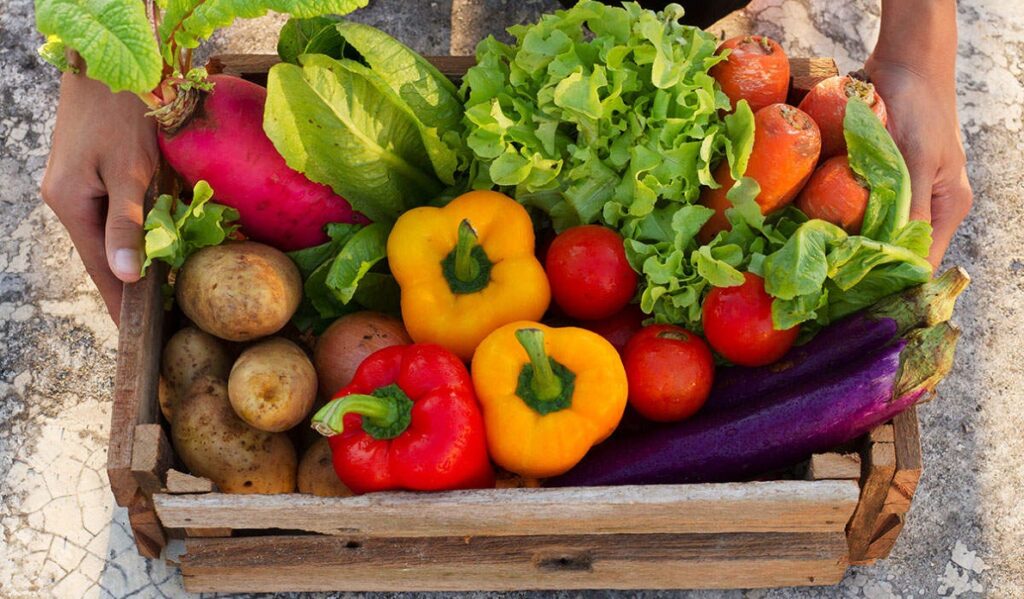
Organic vegetable farming is a sustainable approach to agriculture that emphasizes the use of natural processes and materials to cultivate crops. This method avoids synthetic pesticides and fertilizers, focusing instead on organic inputs and practices like crop rotation, composting, and biological pest control to maintain soil health and biodiversity. Organic vegetable farming not only produces healthier and more nutritious food but also promotes environmental conservation by reducing chemical runoff and enhancing soil structure. This approach supports the resilience of ecosystems and contributes to the overall sustainability of agriculture, benefiting both the planet and consumers.

Organic vegetable farming is a holistic and sustainable approach to agriculture that focuses on growing vegetables using natural processes and inputs. Unlike conventional farming, which often relies heavily on synthetic chemicals and fertilizers, organic vegetable farming employs methods that enhance soil fertility, biodiversity, and ecosystem health. This practice is not only beneficial for the environment but also produces vegetables that are healthier and more nutritious for consumers.
One of the fundamental principles of organic vegetable farming is the use of organic matter to improve soil health. Composting, green manuring, and crop rotations are common practices. These methods help maintain the soil’s organic content, which is crucial for retaining moisture and nutrients. Organic farmers avoid synthetic fertilizers, instead relying on natural sources of nutrients such as animal manure, bone meal, and cover crops. This not only enhances soil fertility but also prevents harmful chemicals from leaching into water bodies, thereby protecting aquatic ecosystems.
Pest management in organic vegetable farming relies on a combination of cultural, biological, and mechanical controls. Crop rotation is a crucial strategy, disrupting the life cycles of pests and diseases. Organic farmers also use beneficial insects and microorganisms to naturally control pest populations. For example, ladybugs and predatory beetles can help manage aphid populations, while certain fungi and bacteria can suppress soil-borne diseases. Mechanical controls like row covers and handpicking pests further reduce the need for chemical interventions, ensuring that the farming process remains organic.
Another key aspect of organic vegetable farming is the selection of crop varieties. Organic farmers often choose varieties that are naturally resistant to pests and diseases, reducing the need for chemical treatments. Heirloom and open-pollinated varieties are popular choices because they can adapt to local growing conditions and often have superior flavor and nutritional profiles compared to hybrid varieties. By preserving genetic diversity, organic vegetable farming also contributes to the resilience of agricultural systems in the face of climate change and other environmental challenges.
Water management is also critical in organic vegetable farming. Efficient irrigation systems like drip irrigation and mulching are used to conserve water and maintain soil moisture levels. Mulching not only helps in water conservation but also suppresses weed growth and adds organic matter to the soil as it decomposes. These practices ensure that water resources are used sustainably, which is increasingly important in the context of global water scarcity.
Organic certification is an essential component of organic vegetable farming. To be certified organic, farms must adhere to strict guidelines set by certifying bodies, such as the USDA in the United States or the Soil Association in the UK. These guidelines cover every aspect of farming, from seed selection and soil management to pest control and harvest practices. Regular inspections and audits ensure compliance with organic standards, giving consumers confidence that the products they buy are genuinely organic.
The benefits of organic vegetable farming extend beyond environmental sustainability and food quality. Economically, organic farming can be more profitable for farmers due to the premium prices that organic products command in the market. Additionally, organic farming practices can reduce input costs over time, as farmers become less reliant on expensive synthetic chemicals. Socially, organic farming supports rural communities by promoting small-scale farming and providing employment opportunities.
Consumers are increasingly demanding organic vegetables due to their health benefits and the perception that they are safer and more environmentally friendly. Organic vegetables are free from synthetic pesticides and fertilizers, which can have harmful residues. They also tend to have higher levels of certain nutrients, such as antioxidants, vitamins, and minerals, making them a healthier choice for consumers. Moreover, the environmental benefits of organic vegetable farming, such as reduced pollution and enhanced biodiversity, align with the values of many environmentally conscious consumers.
Despite the numerous benefits, organic vegetable farming faces challenges, including higher labor costs and lower yields compared to conventional farming. However, ongoing research and innovation in organic farming techniques continue to improve efficiency and productivity. Advances in organic pest control, soil fertility management, and crop breeding are helping to address these challenges, making organic farming a viable and sustainable alternative to conventional methods.
In conclusion, organic vegetable farming represents a sustainable and holistic approach to agriculture that benefits the environment, farmers, and consumers. By using natural processes and inputs, organic farmers produce vegetables that are healthier and more nutritious, while also protecting and enhancing the ecosystem. As consumer demand for organic products continues to grow, organic vegetable farming is poised to play an increasingly important role in sustainable agriculture worldwide.









